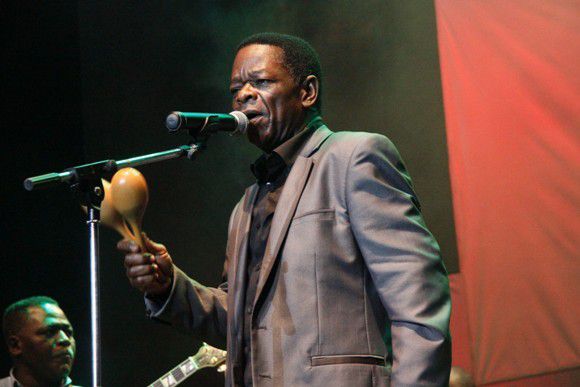One of the finest Congolese musicians, Sam Mangwana, belongs to the generation that excelled from the early 1960s right into the 1990s.
While his former associates, including the grandmaster, Franco Luambo Luanzo Makiadi, are no more, Mangwana continues to do music and in his characteristic style over the years, still travels a lot.
This super vocalist with a sweet alluring voice was also one of the most hilarious performers during concerts with the TPOK Jazz band that recorded some of the biggest songs in Lingala to come out of the two Congos – Kinshasa and Brazzaville.
He had an interesting heritage. His mother was from Angola and his father from Zimbabwe, but he was born in 1945 and grew up in Kinshasa, and would later see his career blossom as he extended his wings over the continent and overseas.
Today, he lives in Angola and has recorded some songs with local groups in Portuguese. The most notable is titled, Cantos de Esperanga, recorded in 2003.
Some of his biggest songs are Fatimata, Bana ba Cameroon, Maria Teboo, and Suzanna Coulibaly. On the huge song, Ebale ya Zaire, composed by Lutumba Simaro Massiya, he was the lead vocalist. In a mid 1970s song, Toyeba Yo, he humorously mimicked the speech of members of various Congolese communities.
He is among the few surviving members of the legendary TPOK Jazz, where he was from 1972 to 1974. Another notable survivor is Wuta Mayi.
His other major associate Kiambukuta Josky died in March this year, following former long-serving band vice-president Simaro and many others, including Madillu System and Ndombe Opetum.
For his propensity to be always on the move, he was nicknamed, Le pigeon voyageur, meaning the travelling pigeon. He not only travelled across countries, but also moved from one band to another.
He is gifted with languages, speaking Lingala, French, Kiswahili, English, Spanish and Portuguese. He mainly sang in Lingala, French and Kiswahili, but has lately done an excellent job in Portuguese.
Advice to women
His song, Furaha ya Bibi, brought out his mastery of Kiswahili, with great words of advice to women. “Furaha ya Bibi ni kuwa na bwana… (the joy of a woman is to have a husband). He then turned it around to say the same about men. Another closely related composition is the praise song, Kabibi, praising a beautiful girl from the East African port town of Mombasa.
For a man so well-travelled and exposed in the entertainment industry, the irony of Sam Mangwana is that he has never got married and is not known to have fathered any children.
Earlier in his career, he teamed up with another mega vocalist, Tabu Ley Rochereau, in African Fiesta, which later became Afrisa International. He had also lined up for bands such as Los Batchichas, Negro Band, TPOK, Orchestre Tembo, Festival Des Masquisards and African All Stars.
Madillu System
Mangwana made his debut in 1963, with Tabu Ley’s African Fiesta. He would later move to Congo Brazzaville and worked with various bands before returning to Kinshasa. In 1967, he teamed up with fellow vocalists Dalienst and Madillu System and guitarists Dizzy Mandjeku and Michelino in Festival des Maquisards.
On joining TPOK Jazz of the grandmaster Franco in 1972, Sam Mangwana participated in the recording of La Poet Lutumba Simarro’s hit compositions Ebale ya Zaire, Cedou and Mabele. He then left TPOK Jazz briefly to return to Tabu Ley’s Afrisa.
He would be on the move again, this time headed for West Africa. He settled in Abidjan, Cote d’Ivoire, where he joined fellow Congolese stars to form African All Stars.
When the group broke up in 1979, he became a solo artiste. This time yielded songs such as Maria Tebbo (1980), Co-operation, which was a huge album he recorded in collaboration with Franco’s TPOK Jazz in 1982.
The song is better known in Kenya as Odongo, because of what many have suggested was the mention of a Kenyan immigration officer, who was popular with the Congolese for solving their visa hitches in the old days.
Today, the travelling pigeon spends most of his time in Angola, but has been doing concerts in Europe, proving that wine tastes better with age.
khagunda@gmail.com




